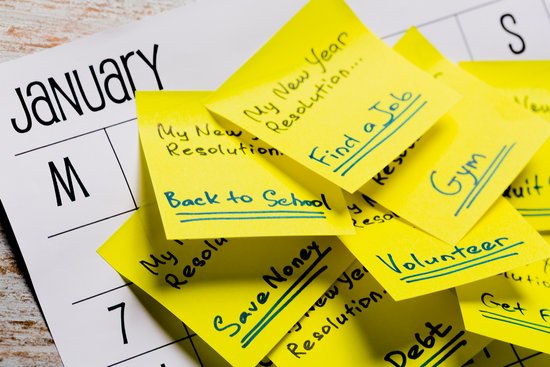
by California Casualty | Health |
New Year, new you. Right? That’s what everyone says. Statistics say that 80% of resolutions fail by February. Remember, you can achieve what you put your mind to, you just have to stick to your goals!
Here are some simple steps to keep from feeling overwhelmed and help you keep your new year resolutions.
- Keep it simple. If your plan is to lose weight, figure out how much you want to shred and then divide that into 11 months. This helps break down a long term goal to small accomplishable goals.
- Accountability. You are more likely to keep at your resolution if your goal is reinforced and encouraged by others. Rely on your support system for the hard days when you’re tempted to give up.
- Track Progress. Include an easy way to track your success to match your goal. A vision board or a journal are some great examples to use.
- Celebrate the wins. Make sure positive recognition is a part of the process. Praise can go a long way.
- Small stumbles will happen. It’s important to remember that bumps will come along the way. That doesn’t mean that you have failed. Write it down on your progress tracker and understand it as a learning lesson.
Change takes time and patience. Don’t give up!
This article is furnished by California Casualty, providing auto and home insurance to educators, law enforcement officers, firefighters, and nurses. Get a quote at 1.866.704.8614 or www.calcas.com.

by California Casualty | Health, Safety |
Halloween is almost here and that means little superheroes, princesses, and ghosts will soon be roaming the streets in search of their favorite sugary treats. Halloween safety
As you spend time planning, decorating and carving pumpkins, remember that a safe Halloween is a Happy Halloween. Whether you’re headed out with the trick-or-treaters or manning the door to pass out candy at home, here are some Halloween safety tips to keep in mind:
Trick-or-Treating with Children:
- Make sure all swords or similar costume accessories are soft, short, and flexible
- Never let children trick-or-treat alone
- Map out a safe route with your kids
- Set a designated time for them to return home or check-in with you
- Fasten reflective tape to costumes and bags to help drivers see trick-or-treaters
- Attach your child’s name, address, and phone number somewhere inside their costume
- Try to walk on the sidewalks as much as possible.
- Carry a flashlight with you—and give one to each child–to help you and others see
- Check to make sure kids are wearing well-fitted masks (or better yet- face paint!), costumes, and shoes to avoid tripping or blocking your vision
- Check over treats before letting kids start eating them- check to make sure they are still commercially wrapped and not tampered with and that they do not present a choking hazard
- Always test make-up in a small area first to check for allergies before applying it to large areas like the face. Be sure to remove all makeup before bedtime to prevent skin and eye irritation
- Remind kids:
- Walk from house to house, never run
- Enter homes only if you are with a trusted adult
- Only visit well-lit homes
- Look both ways before crossing the street
- Never accept rides from strangers
- Never walk near lit candles or luminaries
Prepare Your Home for Trick-or-Treaters:
- Make sure the outside areas of your home is well-lit and free of obstacles
- Be sure to turn on all your exterior lights
- Keep candle-lit jack-o-lanterns and luminaries away from doorsteps, walkways, landings, and curtains. Use battery-operated candles in any outdoor or child-accessible decorations
- Keep pets away from the door so they don’t scare—or get scared by—trick-or-treaters
- Report any suspicious or criminal activity to your local police department or sheriff’s office
- Make sure you do not pass out candy that is a choking hazard to younger children
Have a safe and spooky Halloween!
This article is furnished by California Casualty, providing auto and home insurance to educators, law enforcement officers, firefighters, and nurses. Get a quote at 1.866.704.8614 or visit www.calcas.com.

by California Casualty | Health, News |
It’s fall y’all! And that means it’s time to break out the crock-pot because it is the absolute BEST season to be in the kitchen whipping up cozy fall recipes.
Apples and pumpkins and stews, oh my! All of our favorite cozy fall crock-pot and dessert recipes can be found below and on our Pinterest board, “The BEST Fall Recipes”. Each recipe is linked for your convenience. 🙂
Cozy Fall Crock-Pot Meals:


















Fall Desserts (aka our favorite)



















We could go on and on and on and on…. but we would need a lot more space! Do you have a favorite cozy fall recipe? What about a traditional family recipe you love to create when the weather cools down and the leaves start turning? We’d love for you to share it with is!
Be sure to check out our Pinterest for more fall recipes (including casseroles) and don’t forget to give us a follow at California Casualty to stay up to date on every new fall recipe we discover! Scan our Pincode with your Pinterest camera to follow:

This article is furnished by California Casualty, providing auto and home insurance to educators, law enforcement officers, firefighters, and nurses. California Casualty does not own any of the photos in this post, all are sources by to their original owners. Get a quote at 1.866.704.8614 or www.calcas.com.

by California Casualty | Health |
Fall is around the corner and with the changing of the seasons comes changing of mindset. September is Self Improvement Month, aka time to get back to the basics, set goals for yourself, and really focus on your well-being.
Whether you are caught up in your day-to-day work-home-sleep schedule and you want to make a major change, or you would simply like to drink more water throughout the day, we have a simple list of things that you can do during September to help you improve your mind and body.
1. Get Organized. Clean out all of the clutter, whether it be physical clutter that is piling up and causing you stress at home or work. Or, emotional clutter- negative thoughts that keep you from achieving your goals. A stress-free space promotes positivity and will make it easier for you to reach your mental and physical goals.
2. Be More Healthy. Create a meal plan that you will actually stick to. Only eat out once a week, cut down on the fried food, drink enough water, eat more fruits and vegetables, monitor your caffeine/sugar intake. All of these are easy goals that you can implement into your diet to help your body feel stronger and less sluggish.
3. Change Your Habits. Yup, way easier said than done. Current habits that make you feel less than your best didn’t become habits overnight. Start with one thing you can do differently that would make you feel better mentally or physically. If you tend to feel rushed or stressed in the mornings, spend 10-15 minutes prepping the night before. Find yourself plopping down on the couch immediately after work? Take a walk around your building or parking lot before getting in the car to head home. Always reaching for that soda or sugary snack at a certain time of day and feeling guilty afterward? Replace it one or two days a week with an alternative that doesn’t make you feel bad about yourself. Regardless of what habits you want to change, focus on how you feel when you make an adjustment. Harness the positive feelings from the changes you make to keep yourself on track.
4. Get Out and Go. Plan a vacation or stay-cation. You could go take a trip across the world or build a fort in the living room. Just unplug yourself for a weekend (or longer) and don’t do anything work-related. It will give your mind the time it needs to rest and recoup.
5. Start Saving. It’s simple; pay your bills/loans, set a budget, and check your financial accounts daily. You could even set up an additional account and set a goal amount to put in each month. Having financial freedom, or at least some financial wiggle room, will take a giant weight off of your shoulders.
6. Don’t Be Complacent. If you aren’t happy in your career or relationship, leave. It may be complicated and seem scary, but your happiness is suffering because you are doing or are with someone that is bringing you down physically and emotionally. Do something for yourself and get the courage to get out, there will always be another partner or career, you just have to go find them.
7. Relax. It may seem impossible to find free time in your hectic day/week. This is why you need to make time to do something that relaxes you. It doesn’t have to be for a long period of time (but it certainly can be). Take ten minutes to do something that will put your mind in a positive place and get you ready to take the rest of the day or night. Some easy examples include taking breathing exercises, meditating, taking a short walk, listening to music or podcasts, getting a massage, or even just sitting with your eyes closed for a few minutes.
8. Challenge Yourself. Set attainable goals and create step-by-step plans to accomplish them. What do you want to do but always seem to find a reason not to? but you have yet to accomplish it make a goal for yourself to get it done within a certain time frame. The best way to keep the motivation to accomplish goals is to write them down physically and place them somewhere that you will see them often like the mirror or on the fridge. Write the end date on the bottom in big letters as a reminder of when you want them accomplished. Try and tell as many people as you can about your goals, so they can help hold you accountable.
It is important to remember that making changes to improve yourself may not happen overnight. There will be times you stumble. Eat ice cream three nights in a row and pass out watching Netflix? Spend a little too frivolously since last pay day? Don’t be too hard on yourself. Try to be more conscious of your decisions. Self-improvement is an investment in yourself! Take it one day at a time, keep your goals in mind, and never give up.
This article is furnished by California Casualty, providing auto and home insurance to educators, law enforcement officers, firefighters and nurses. Get a quote at 1.866.704.8614 or www.calcas.com.

by California Casualty | Educators, Health |
Summertime for teachers doesn’t necessarily mean “vacation”. There are, lesson plans to develop, hours of PD sessions, and classrooms to prepare. Many teachers have summer jobs or teach summer school, so accomplishing goals and tasks that get put off during the school year is easier said than done.
We’ve put together a game plan to help you accomplish the top five realistic goals that teachers tend put on the back-burner during the school year. Even if what you want or need to do varies from the list below, writing down your goals is a solid first step to achieving them – especially if you are a teacher who is short on time. So open up your planner, grab your Flair pens and get ready to amaze yourself.
Goal #1: De-clutter
Less clutter = less stress = happiness 🙂
How to Accomplish: It’s time to channel your inner Marie Kondo. Getting rid of all of the clutter you’ve put aside planning to get to later needs to be the first thing you do this summer. The first thing?! We know. Bear with us. The sooner you put away all the stuff you carted home from your classroom, address the mountain of laundry in the corner, and tackle the layers of memories of years past- barely hanging on- beneath the magnets covering the fridge; the quicker you can start enjoying your summer. Clutter causes stress. To avoid stress, we avoid cluttered areas or try to pretend it isn’t there. Identify the area or room that gives you the most anxiety and start there. The quicker the clutter is gone, the quicker you can focus on more important things-like a cold drink by the pool.
Goal #2: Sleep
This one is pretty self-explanatory…
How to Accomplish: Draw the blinds and turn off all of your alarms. zzZZZZzzzzZZZzzzZZZzzz
Goal #3: Exercise
It’s beneficial for your physical AND mental well-being.
How to Accomplish: You don’t have to go crazy, buy a gym membership or start training 24/7…unless you want to. Exercise can range from number of different activities like: taking a walk, swimming, riding your bike to the playground with your children, or an intense game of water balloons. Set aside 30 minutes, 3 or 4 times a week to move your muscles and de-stress. Start looking at exercise as positive, like playing with your kids, and you will be more likely to do it instead of sitting on the couch dreading getting on the treadmill.
Goal #4: Work On Yourself
Take some time for “me-time”.
How to Accomplish: Whether you want to get started on your MBA or have a Harry Potter marathon in your PJ’s; write down a few things down you want to do this summer, solely for YOU and YOUR happiness, and make sure to follow through. Here are a few examples that we have rounded up & linked to sources for you, just click on each word!
You give so much of yourself during the school year. Be sure to take a little time during the summer for yourself to do and discover things that YOU love.
Goal #5: Spend Time with Friends & Family
They miss you during the school year.
How to Accomplish: Make a point to do things together as a family, like eating meals at the table, taking a road trip, or having a picnic in the park. Soak up all of the family time you can. During the summer is also a great time to talk to the family that doesn’t get to see you every day, like your parents or grandparents. Schedule time to visit or talk to them on the phone. And don’t forget about friends! Friends play a key role in our happiness and mental health so, set aside some time to get together for a night out, a backyard BBQ, or your other favorite activities.
The key to accomplishing summer goals is to keep them realistic. So set aside some time, choose what goals would make you the most happy, and go get your highlighters because this summer you are going to accomplish ALL of your summer goals. One color-coded tab at a time.

This article is furnished by California Casualty, providing auto and home insurance to educators, law enforcement officers, firefighters and nurses. Get a quote at 1.800.800.9410 or www.calcas.com.
by California Casualty | Health |
Summer is here and it is the perfect time to take a vacation. However, many people think they are either too busy for or simply don’t need to take time off during the year; but getting away is actually beneficial to both your physical and mental well-being.
So, stop making excuses and consider these five reasons why need to take a vacation this summer:
- Relax and Recharge- Sometimes you simply need to recharge your batteries. When you’re busy all the time, you can really wear yourself out; but taking a trip can increase your energy levels so you’re ready for a fresh start when you get back.
- Stimulates Your Brain- Giving your brain a break from daily life allows it a chance to reboot. Relaxing also helps your brain function. When it’s not focusing on all of your normal tasks at work, your brain can also discover and learn new things.
- Improves Physical Well-being- Skipping vacation and not taking time for yourself can increase stress levels and decrease energy levels, which leads to being mentally and physically burnt out. The effects of work-stress and fatigue can also weaken your immune system, making you more vulnerable to sickness.
- Boosts Your Mental Health-Taking a vacation and being on your own schedule is a great way to get out of a slump and find motivation again. The time off gives you change in perspective and can help get your mind back in the right place; and you’ll likely sleep better not thinking about work all of the time.
- Makes You More Productive-Working long hours and constantly busying yourself could cause a decline in work quality and performance. So, it’s no surprise that taking a few day break may help improve your performance and increase productivity.
Don’t sweat missing a few days of work, remember, it will always be there when you get back. Whether you decide travel cross-country or plan a stay-cation, you’ll feel rejuvenated and ready to take on anything when you return. So, load up the kids, pack on the sunscreen, turn on our “Kid-Friendly Summer Road Trip” playlist on Spotify, and hit the road.
Happy Travels!














































